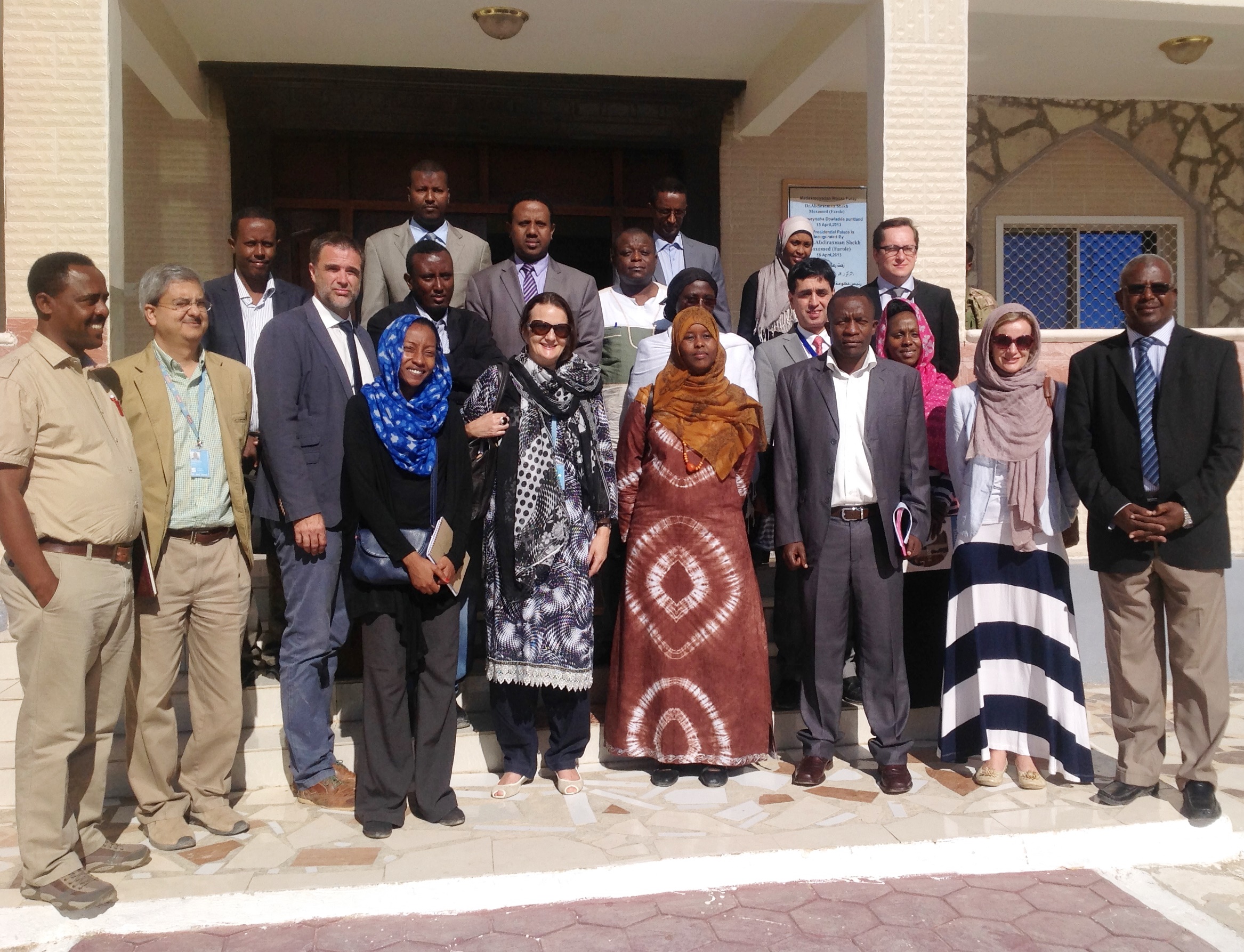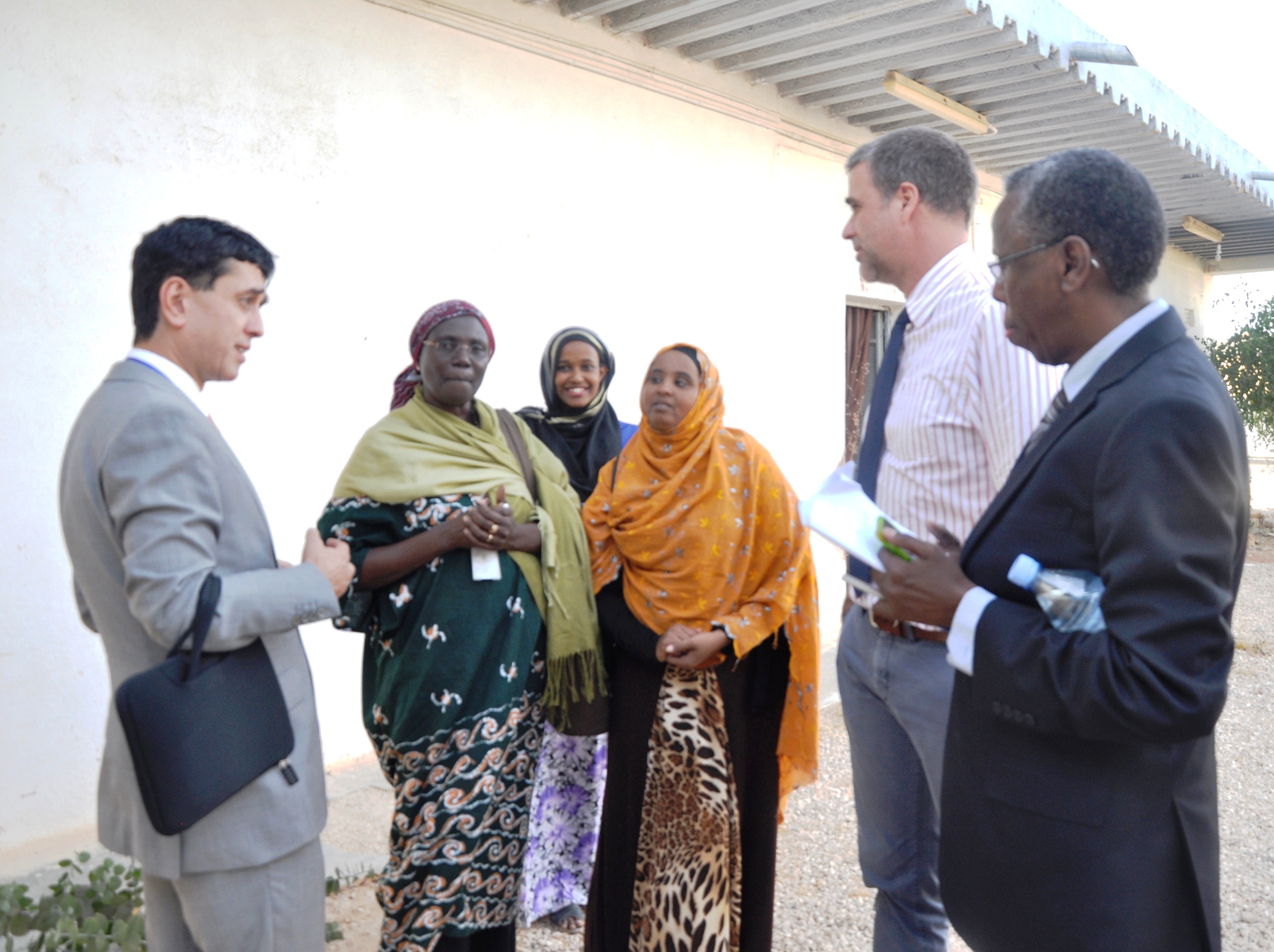The President of Puntland State of Somalia Dr. Abdiweli Mohamed Alihas expressed his government's gratitude towards the Joint Health and Nutrition Programme (JHNP) and called on donors and partners to upscale the initiative by extending it to more underprivileged and minorities in the state.
The Puntland president made the remarks on January 27 when some of the JHNP donors namely UK's Department for International Development (DFID), the Government of Sweden, and the Swiss Development Cooperation (SDC) paid him a curtsey call at the end of their visit to JHNP initiatives in the region. They were accompanied by UNFPA, UNICEF and WHO, who are the three implementing agencies of the programme.Health Authorities of Puntland led by the Honourable Minister of Health were also present.

The UN agencies execute JHNP activities through the government ministry, international and local NGOs.Other donors who support the programme include the Australian Agency for International Development (AusAID), US Agency for International Development (USAID) and the Government of Finland.
Initiated in 2012, with an overall budget of US$ 236 million, JHNP is a comprehensive multi-partner five-year development programme aimed at achieving the health MDGs and following the principles of the Somali Compact/New Deal.While scaling-up the delivery of the reproductive, maternal, newborn and child health (RMNCH) services, the JHNP addresses the six building blocks for efficient health system functioning, building and strengthening foundations in order to improve the health and nutritional status of Somali people.

"Rest assured that your support is giving life to so many people in Puntland. Our priority now is to reach the vulnerable and those in the rural areas. We need more mobile schools and clinics so that we even reach those who have been neglected for long," said President Abdiweli.
The President also spoke of his government's efforts in working towards improving birth spacing, putting an end to early marriage and stopping female genital mutilation.
He said these are traditional practices and difficult to get rid of but that his government was working diligently on initiatives to end them.
"FGM is a barbaric act. It is not Islamic. We should all be using religious scholars and traditional leaders to help us stop the bad cultural practices," His Excellency Abdiweli said.
Deputy Ambassador for Sweden in Somalia Urban Sjostrom said the donors were impressed by the work that is being done through the JHNP in Puntland and requested the president to allocate more money towards health initiatives to make the JHNP more sustainable.

"We need to develop an action plan on how we can work together to reach out more to the vulnerable. We will all be judged by the health of the vulnerable," said Sjostrom.
Somalia Health Advisor for DFID Karen Stephenson said the JHNP needs to show more results widely. She emphasised on the need for more and improved coordination of the programme.
UNFPA Deputy Representative Grace Kyeyune assured the Puntland President and the JHNP donors of renewed commitment in efforts to reach the unreached including women and young people.
UNFPA also thanked the President for his support to the CARMMA and his commitment to the cause of reducing maternal mortality.
The referral hospital in Garowe ,which the donors visited,is the site of a comprehensive emergency obstetric and neonatal care (CEmONC) project supported by UNFPA with funds from the JHNP. The donors were impressed by services offered in a newly constructed maternal and neonatal health unit in the hospital within the framework of the project, which is registering an increase in the number of free facility-based skilled attendance at birth as well as the number of mothers benefiting from lifesaving cesarean sections and blood transfusions.

A comprehensive GBV response center located in the Garowe referral hospital, supported by UNFPA, was of particular attraction to the donors. Both DFID and SIDA expressed great appreciation of the work of this center with its linkages to the CEmONC project in the hospital, most especially as the gynecologist on the CEmONC project is a trainer and a good service provider in the area of clinical management of rape cases received at the GBV center
Other UNFPA projects visited by the donors include the maternity waiting home situated in the IDP camp as well as a midwifery training institution in Garowe. The donor visit coincided with the graduation ceremony of a batch of 20 midwives from this institution.

The donors, who visited Garowe from January 25 to January 27, 2015, promised more support to the JHNP. They also promised their availability for subsequent field visits in the nearest future and gave some recommendations to the UN agencies especially in the area of enhanced coordination, greater quality of service delivery and reaching out to the most vulnerable in a more effective and efficient manner.

